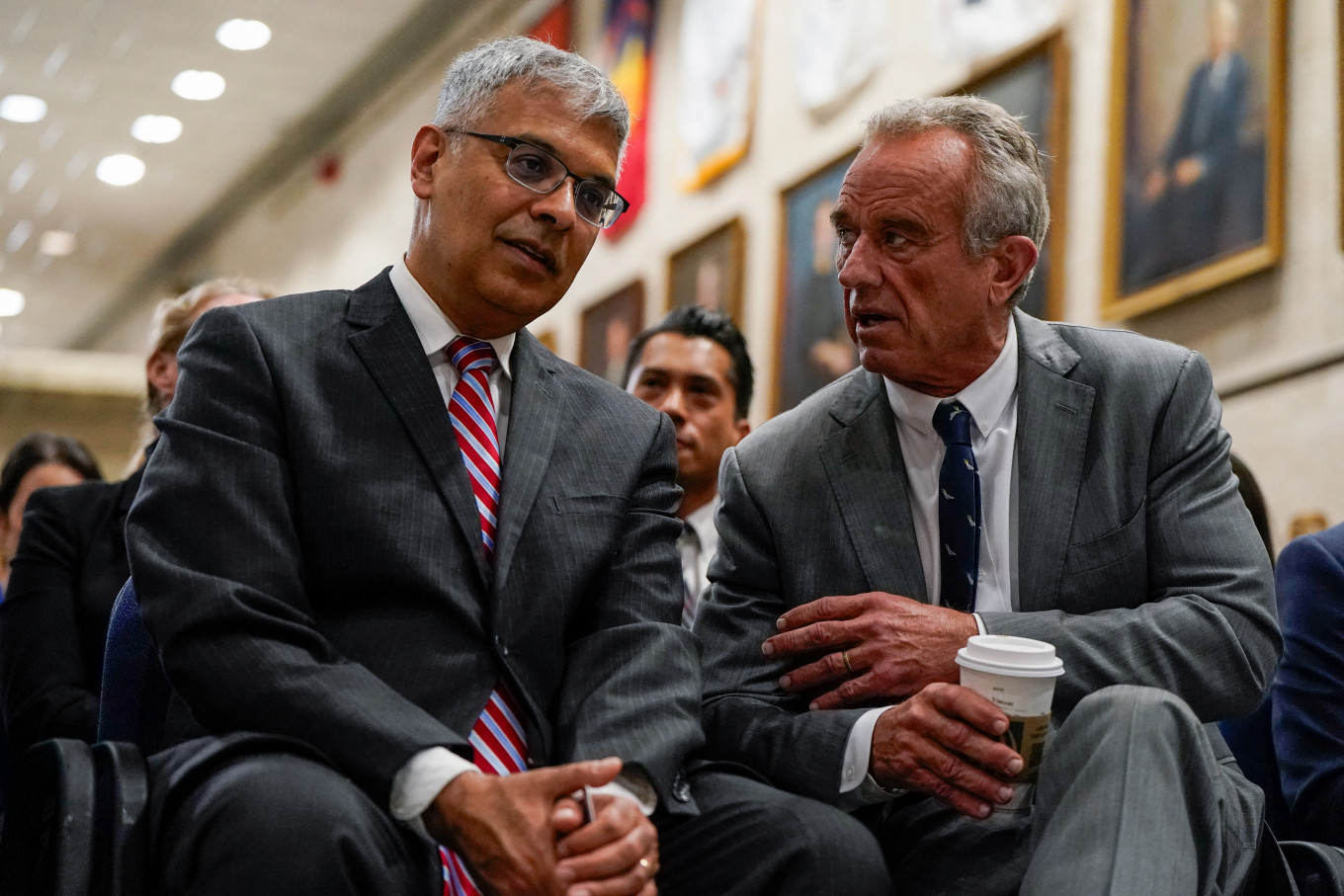Popular Reads
Top Results
Can't find what you're looking for?
View all search resultsPopular Reads
Top Results
Can't find what you're looking for?
View all search resultsUS to phase out many synthetic food dyes, Kennedy and FDA head say
Change text size
Gift Premium Articles
to Anyone
 US Health and Human Services (HHS) Secretary Robert F. Kennedy, Jr. speaks with Director of the National Institutes of Health Jay Bhattacharya ahead of a press conference announcing the US Food and Drug Administration's (FDA) intent to phase out the use of petroleum-based synthetic dyes in the nation's food supply, at the Department of Health and Human Services in Washington, DC, on April 22, 2025. (Reuters/Elizabeth Frantz)
US Health and Human Services (HHS) Secretary Robert F. Kennedy, Jr. speaks with Director of the National Institutes of Health Jay Bhattacharya ahead of a press conference announcing the US Food and Drug Administration's (FDA) intent to phase out the use of petroleum-based synthetic dyes in the nation's food supply, at the Department of Health and Human Services in Washington, DC, on April 22, 2025. (Reuters/Elizabeth Frantz)
U
S Health Secretary Robert F. Kennedy Jr. and FDA Commissioner Marty Makary said on Tuesday that the agency plans to remove synthetic food dyes from the US food supply by revoking authorizations of some and working with industry to voluntarily remove others.
They cited concerns about a possible link between consumption of the dyes and health conditions like ADHD, obesity and diabetes, an area many scientists say requires more research.
It was not clear what studies Makary was referencing on the link between dyes and health problems. He held up a study he identified as being from The Lancet, a prestigious European medical journal. In 2007, a study in that journal found a link between food dyes and hyperactivity.
During a joint press conference that also included Kennedy's Make America Healthy Again supporters and lawmakers in states that have food dye legislation, Kennedy and Makary raised a wide range of issues they want to address in the food supply.
Kennedy said the efforts to remove additives from food were necessary to address chronic disease in children and, without evidence, suggested it would address rising rates of conditions ranging from ADHD to food allergies.
Makary said the agency would begin the process of revoking authorization for two synthetic food colorings within the coming months and would work with industry to eliminate six other dyes by the end of next year.
The Food and Drug Administration in a press release said it plans to authorize four new natural color additives in the coming weeks, while also accelerating the review and approval of others.
While Kennedy and other speakers asserted a strong link between synthetic food dyes and a wide range of health concerns, scientists say there is not yet a large enough body of evidence that food dyes cause any of those problems.
"The information out there is just so minuscule in the scheme of science that it's really hard to make those generalizations," said Emily Acri, a clinical transplant dietitian at Yale New Haven Hospital.
Makary said the transition from artificial food dyes to natural ingredient dyes will not increase food prices. He suggested that food makers use ingredients like watermelon juice, beet juice and carrot juice to color their food.
It also plans to partner with the National Institutes of Health to research how food additives impact children's health and development.
"For the last 50 years, we have been running one of the largest uncontrolled scientific experiments in the world on our nation's children without their consent," Makary said.
Removing the dyes from the food supply will not instantly make American children healthy, he said, but that it was an important step. Kennedy said the agency would soon target other additives.
Kennedy said his Department of Health and Human Services (HHS) had an understanding with the food industry on removing artificial dyes, and Makary said he was hoping companies would adjust their ingredients without any statutory or regulatory changes, but that he is looking at tools to ensure compliance.
The Consumer Brands Association, which represents food makers such as PepsiCo and Kraft Heinz, in March sent a proposal to HHS outlining actions the industry would take to remove the dyes from its products, according to a document obtained by Reuters. The CBA previously met with Kennedy to discuss food dyes, Reuters reported.
The proposal calls for food companies to pledge to prioritize making new products without artificial colors and start removing them from existing items, according to the document.
By the end of the year, the food companies will make products without artificial dyes available to schools, according to the document.
The CBA and the National Confectioners Association, which represents candy makers, both said late on Tuesday that the ingredients in their member companies' products are safe.
W.K. Kellogg said it recently met with Kennedy and is reformulating its cereals served in schools to not include artificial dyes. The cereal manufacturer also said it will not launch any new products with artificial dyes beginning next year.









